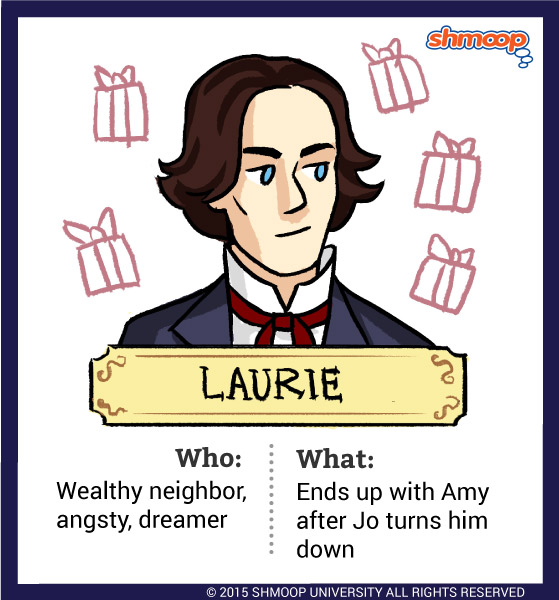Character Analysis

(Click the character infographic to download.)
Laurie, short for Theodore Laurence, is the March girls' wealthy next-door neighbor. He's a high-spirited young man about the same age as Jo. Until the March girls come along, he's moody, bad-tempered, and often bored. Like many other teenagers, he has plans for his life that are pretty different than his guardian's. His grandfather, old Mr. Laurence, wants him to go into the family business and be a merchant, importing expensive goods from India. Laurie, however, wants to be a great composer, or maybe just run away and have adventures while traveling. And like many other teenagers, Laurie compromises with his guardian by agreeing to go to college.
When Laurie and Jo meet, they immediately hit it off and become good friends. Laurie's feelings eventually turn romantic, but Jo insists that she could never fall in love with Laurie. In a way, it's because they're too similar – both of them have touchy tempers. But really, it's not Laurie's fault. Jo likes him, but doesn't love him. Luckily, he's able to transfer his affections to her sister Amy, whose genteel manners make a much better match for his wealth and social position. It's a happy, if creepy, ending to their love triangle.
Laurie's main function in the narrative, besides providing a Y chromosome in this heavily-female novel, is to show the redeeming influence of the March girls. At many points, including his time in college and his period of distracted wandering through Europe, Laurie is in danger of doing what nineteenth-century society called "going to the bad" – gambling, taking a mistress, drinking, or other "dissolute" behavior. But his friendship with the March girls, his desire to keep their good opinion, and his tendency to absorb their moral principles all work together to keep him on the straight and narrow.